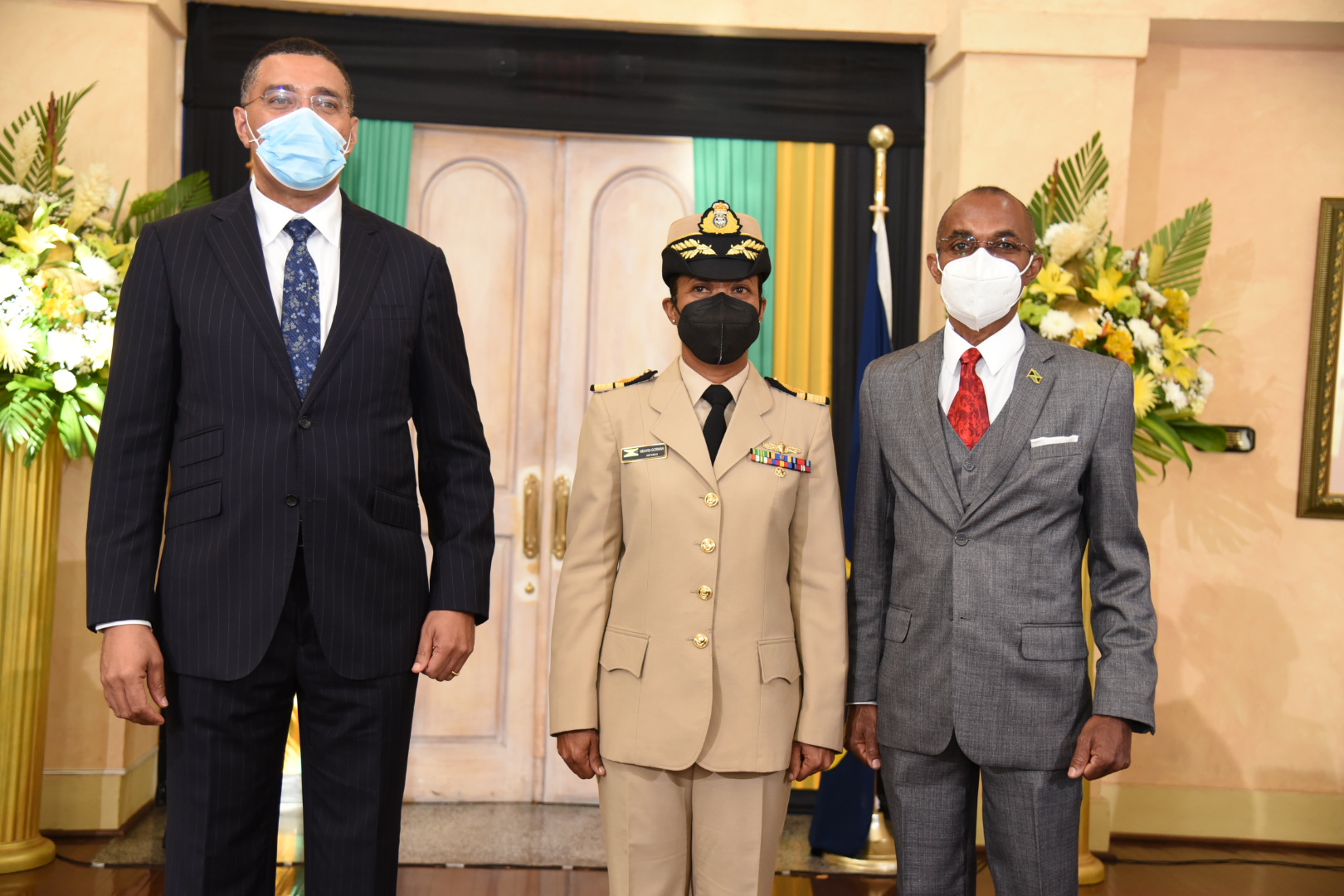#Jamaica, January 28, 2022 – History was created on Thursday (January 20) when Rear Admiral Antonette Sandra-Lee Wemyss Gorman was installed as the Jamaica Defence Force’s (JDF) first female Chief of Defence Staff (CDS).
Governor-General, His Excellency, the Most Hon. Sir Patrick Allen, presented her with the Instrument of Appointment during a ceremony at King’s House, which also saw her subscribing the Oath of Allegiance and the Oath of Office.
Admiral Wemyss Gorman succeeds Lieutenant General Rocky Meade who retires from the JDF after serving for 38 years, the last five as CDS.
Prime Minister and Minister of Defence, the Most Hon. Andrew Holness; Deputy Speaker of the House of Representatives, the Most Hon. Juliet Holness; and Deputy Prime Minister and Minister of National Security, Hon. Dr. Horace Chang, headed the government and other officials attending the ceremony.
Representatives, the Most Hon. Juliet Holness; and Deputy Prime Minister and Minister of National Security, Hon. Dr. Horace Chang, headed the government and other officials attending the ceremony.
Mr. Holness, in congratulating Admiral Wemyss Gorman, said her selection through a competitive process by the Defence Board was based on that body’s conclusion that she has the requisite leadership skills, experience, commitment, and strategic vision “to lead the men and women of the JDF and drive them to achieve even greater levels of success”
In highlighting notable achievements of Admiral Wemyss Gorman’s 29-year military career, Mr. Holness said her tenure in the Coast Guard allows her to treat significantly with issues relating to maritime security and the blue economy.
“She will, therefore, bring a unique perspective to our discussions and efforts to strengthen our borders and prevent illicit inflows, protect the lives and livelihoods of our coastal communities, and ensure Jamaica can derive sustainable benefits from our maritime resources. I look forward to benefiting from her wise counsel on matters relating to defence and security,” he added.
The Prime Minister said that as the fight against crime continues, the JDF will continue to play a critical role in support of the Jamaica Constabulary Force (JCF). The JDF will continue along the path of transformation and capacity building, as it positions itself to more effectively and efficiently combat current and future security threats, locally and in the wider Caribbean.
He also expressed confidence that the JDF will continue to positively impact youth, “not only through the Jamaica National Service Corps but also its various community service activities, and its deepening partnership with the HEART/NSTA Trust and other entities”.
The Prime Minister said it is anticipated that under the new CDS’s leadership, “we will continue to build on our relationships with our military partners within the region and beyond”.
“I know that the CDS is committed to building on these partnerships… and enhancing the JDF’s sterling reputation at home and abroad. I am confident that, in you, Jamaica has a strong, committed, and capable leader who will continue to lead our troops and give of your best to the country, as well as those [who] will come under your command,” he added.
Mr. Holness said a defining feature of the JDF is its “sense of continuity”, noting the smooth transitions from one commander to another over the years. He pointed out that over the past two years, while serving as the JDF’s Executive Officer, Admiral Wemyss Gorman worked closely with General Meade, who, he said, “has laid a solid foundation on which the new commander will continue to build”.
Mr. Holness, in thanking General Meade for his stellar service to the JDF and Jamaica, noted his commitment to education, youth, and achieving and maintaining high standards, which, he said, have produced “significant changes” across the country.
“We will build on the foundation that you have established and strive to make the JDF even more capable and fit for purpose. We can safely say that the future of the JDF is in very capable hands, and this is due, in no small measure, to the way in which you have led the Force over the past five years,” he added.
In her reply, Admiral Wemyss Gorman, who said she was “humbled and privileged” by her appointment, expressed gratitude for the display of confidence “in my ability to command the men and women of the Force”.
She said her tenure in the JDF over the years has equipped her with “valuable tools” and honed the skills required to prepare for the job of CDS.
Admiral Wemyss Gorman also expressed gratitude to her predecessors for playing significant roles in her development
“Thank you for the examples of committed and capable leadership that you demonstrated, which have laid the foundation for me to build on,” she added.
The CDS pledged to uphold the Oath of Office and, in doing so, “I commit to decisive, firm, and strategic leadership, which is required in today’s complex and ever-changing security environment”.
The Governor-General, also congratulating the new CDS, noted her outstanding military track record, while expressing confidence that “you will continue to serve with distinction”.
“You will be a positive role model for women and men alike as they witness what can be achieved through determination and purpose,” he said.
The Governor-General also thanked General Meade for his 38 years of dedicated service.
“As the Commander-in-Chief of the Jamaica Defence Force, I am proud of the men and women who serve. Let us support them as they work tirelessly to secure the physical integrity and territorial waters of our country,” he added.
Contact: Douglas McIntosh
Release: JIS

